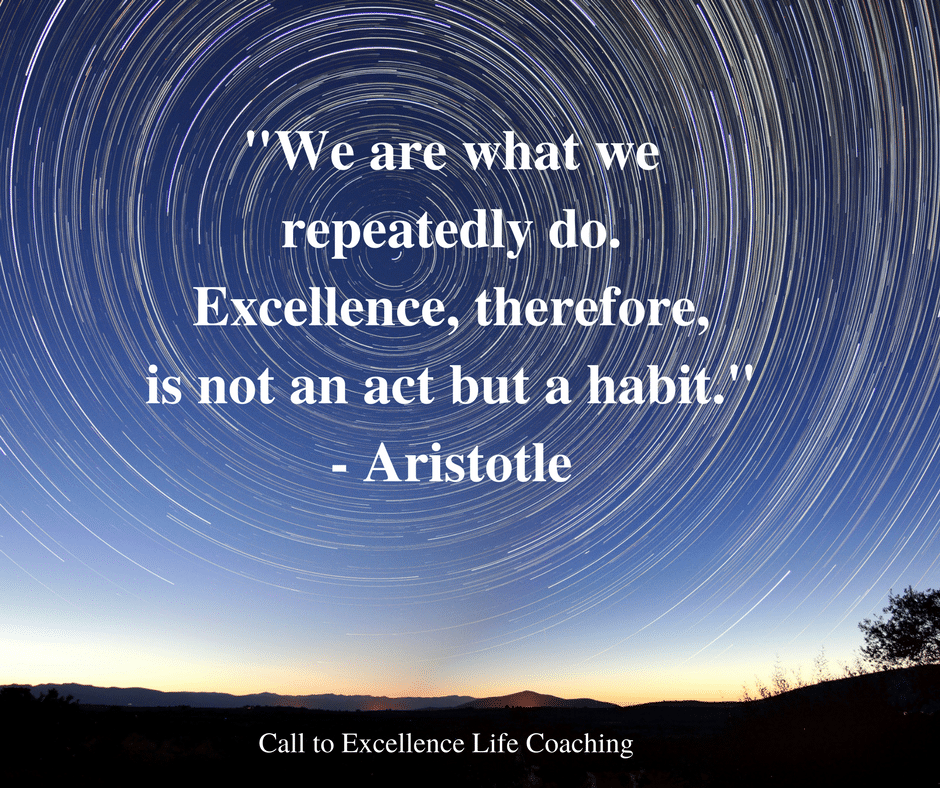
Hello and welcome to my blog! As you can probably guess, based on the name of my website, the theme of this blog is going to be excellence: what is it, why should we pursue it, and how can we develop it in all areas of our lives?
Excellence is one of those things that we all recognize when we see it. We admire it. We reward it with gold medals, trophies, Oscars and Grammies, Hall of Fame inductions, etc… But it’s a hard word to nail down and define.
The Dictionary.com definition of excellence isn’t very satisfying either: “the fact or state of excelling; superiority; eminence.” Aside from the problem of using the root of the word itself in the definition (something that was drilled out of me as an absolute no-no in grade school), it doesn’t give us much guidance.
It may be easier to start with what excellence is not.
Because we recognize accomplishments and reward people or groups who clearly demonstrate excellence in their field, excellence often gets confused with achievement. And that makes excellence into something unattainable, something a select few people were born with, like the extraordinary talent to be able to do a backflip on a 4-inch balance beam, or to throw a baseball at 95 miles an hour. If you haven’t achieved something big and newsworthy, excellence must be out of your reach.
But excellence is not an achievement. True, a commitment to excellence, when combined with an innate talent or passion, can lead to extraordinary achievement. But excellence is the years of practice, relentless focus, and continual improvement that eventually culminates in the act or event or body of work that leads us to recognize that person as an example of excellence. The ancient Greek philosopher Aristotle captured this nuance in his famous saying: “Excellence, therefore, is not an act but a habit.”
Excellence also gets confused a lot with perfection. And that has negative repercussions. It’s discouraging, because we know perfection here on earth is impossible. So, if we equate excellence with perfection, why bother to try? But we see examples of excellence all around us, so they must not be equivalent. Excellence IS something we humans can attain.
The relationship between excellence and perfection was perhaps captured best by legendary football coach Vince Lombardi: “Perfection is not attainable, but if we chase perfection we can catch excellence.” As we consistently pursue a vision of the ideal, whether it’s in our career or relationships or fitness or a hobby, and continuously improve and move closer to that ideal, we eventually cross a threshold into the zone of excellence. This idea is echoed by Hall of Fame basketball coach Pat Riley: “Excellence is the gradual result of always striving to do better.”
And because excellence is based on a process of continual improvement, it’s something we can ALL pursue and attain. That’s right. All of us. Every single person on the earth has the capacity for excellence.
So, now we have a little bit of an idea of what excellence is and what it is not. It’s not complete, but it gives us a place to start. To make sure we’re all on the same page, I’d like to add a few more characteristics to better define how I personally think of excellence, and how I’ll be using the concept in future posts:
- Excellence is a mindset – a way of approaching life. A mediocre mindset settles for ‘good enough’. It makes excuses to avoid doing the hard work. It seeks out comfort and distraction – according to a 2016 Nielsen survey, the average adult spends approximately 10 hours and 39 minutes a day (a DAY!) consuming online media using some type of electronic device. Imagine what could be accomplished if just a fraction of that time and energy was focused on an intentional pursuit?In contrast, excellence pushes for more. Someone living from a spirit of excellence is constantly asking (and acting on) questions like: How can I do this better? Where else can I improve? What else can I learn? How can I go the extra mile? Excellence does whatever it takes, no matter how uncomfortable or inconvenient – no excuses.
- Excellence is a habit, or a composite of habits, that can be further developed. No matter where you currently are on the spectrum of excellence, you can improve in any and every area of your life that you choose. Terry Orlick, PhD, a sports psychologist and performance expert who has worked with thousands of pro athletes and Olympians as well as high achievers from a variety of fields, wrote a book, “In Pursuit of Excellence,” that is essentially a textbook on excellence. In his book, Orlick describes the key components that contribute to excellence: focus, commitment, distraction control, ongoing learning, positive images, mental readiness, and confidence. Each of these elements can be learned, developed, and refined. We’ll explore how the specific habits of high achievers fit into these categories, and how we can integrate these habits in our own lives, in much greater detail in future posts.
- Excellence is first and foremost about competing with yourself. While we typically recognize excellence in competitive situations, when an individual or team or company ‘wins’ – and this competition may drive people or groups to perform their best – excellence is fundamentally about pushing yourself to realize your own full potential. You are your own benchmark. The only performance you have control over is your own. Stay focused on your own lane. Every morning excellence asks: how can I be better today than I was yesterday? And every evening it asks: how can I be even better tomorrow?
- Excellence is about giving 100% to whatever you are doing. Excellence doesn’t phone it in. It requires focus and total commitment. And this means being selective in choosing what you commit yourself to doing – if you are spending time on an activity where you find it impossible to give your best, or one that makes you miserable and drains your energy, think carefully about why you are doing it. As billionaire Warren Buffet said, “The difference between successful people and really successful people is that really successful people say no to almost everything.” Choose how you spend your time and energy wisely, so that those activities that make your list can receive your best effort.
- Excellence pays attention to details. I remember going once to a restaurant and having a great meal. I settled back, ready to enjoy my after-dinner coffee, but when I took my first sip, something slimy and nasty slid into my mouth. I spit it back into the cup, the server took it away, and brought me a fresh cup. But the damage was done. My entire experience was marred by that one small detail.
In contrast, another time I went to a restaurant and was seated at a table for eight. The food was delivered by four servers who put the plates in front of us with the exquisite precision of synchronized swimmers in the Olympics. It was amazing. I don’t even remember what I ate, but I recommended that restaurant to everyone I knew.
Notice that in both examples the ‘big’ thing – the food itself – didn’t contribute much to my impression of the restaurant. Little things matter. Details can be the razor-thin margin between success and failure.
- Excellence requires a learner mindset. It’s about being open to new ideas and new ways of doing things. There is a widely repeated saying: “If you keep doing what you’ve always done, you’ll keep getting what you’ve always gotten.” A learner mindset remains open-minded and flexible. It is curious and creative.
- Excellence asks: Who is already doing what I want to do and what can I learn from them? Where can I get more information? How can I look at this from a different perspective? What are all of the possible options? What can I learn from this setback? Where can I get objective feedback?
- Excellence requires consistency. You can’t decide to pursue excellence one day, slack off the next few days, give it 80% effort the next, and expect to get very far. It just won’t work. Excellence is about giving your all and continuously striving for improvement, day in and day out, whether you are in the mood or not. Slow but steady advances build on each other and accumulate over time, creating a solid foundation that holds up when it is tested. And many times our biggest breakthroughs come from pushing through and doing what needs to be done when we least feel like it.
- And last but not least, a spirit of excellence is most powerful when it is coupled with your unique gifts, talents, and passions. Sure, someone who hated math but had an iron will could probably eventually become a highly competent accountant if they invested all of their energy into studying and improving their knowledge and abilities, but I’m not sure they could ever cross over into the zone of excellence. Not to mention that it sounds like a recipe for a depressing life.
Keeping up the long-term effort that excellence requires, dealing with the setbacks, and experiencing joy and fulfillment throughout the process, requires passion for what you’re doing. And that comes from tapping into those things that make you come alive and fill you with energy.
Well, I think that captures many of the key elements of excellence. I hope I’ve at least tweaked your interest in the concept, and made you begin to wonder how excellence can be applied to the different areas of our lives.
In future blog posts, we will dig deeper into the individual habits that contribute to the development of excellence, and strategies we can use to develop and strengthen them in the different spheres of life, like career and relationships and health. We’ll also take a look at inspiring examples of excellence in action, to see what we can learn. Finally, I’ll tell you about a personal challenge I’m undertaking, something I’m calling the ‘Excellence Experiment,’ to test the hypothesis that pursuing excellence can transform a life from ordinary to extraordinary. Maybe you’ll even want to challenge yourself to your own ‘Excellence Experiment’…
I hope this blog will convince you that excellence is something you too can attain (or expand into other areas of your life), and motivate you to embrace living with a spirit of excellence!







22 thoughts on “What Is Excellence?”
This is a great post to inspire me. It teaches me many key elements of excellence eg mindset, habit, consistency. I am sure excellence is something I can attain and expand into many areas of my life. Great post.
Thank you Kumamonjeng – so glad you were inspired! You can definitely attain excellence – just focus on the process of continual focused improvement, and study people who demonstrate excellence in the areas of life that interest you – keep your trajectory moving forward and upward and you will get there over time 🙂
Very well explained! Most of the time, Excellence are just one big word that not many people care to dig deeper… and you have greatly explained it here pretty well! Thank you for the wisdom! <3
Thank you JM – I’m glad this explanation is helpful. I think a lot of people are intimidated by the word excellence because they don’t have a good definition, or they mix it up with perfection – but excellence is something we can all strive for and attain when we understand what it really is 🙂
This is really interesting. I have to admit I’ve got excellence confused with a lot of the words you mentioned. I’m going to work on those habits of excellence ????
Thanks Lucy! You’re not alone – there’s a lot of confusion out there when it comes to excellence, and I think it keeps a lot of people from developing their own inner excellence. Good luck with developing those habits!
Wow, I had no idea there was so much discussion about excellence. I appreciated how you discussed all the aspects of the word. My biggest struggle is consistency.
Consistency is a challenge for most of us, myself included 🙂 The key here is to turn the behaviors you want into habits, so that you do them automatically (and therefore consistently). You might find some of my posts on habit change, kaizen, and microresolutions helpful with this.
Bravo, Susan, for your call to excellence! As a child I remember a poster that read, “Strive for excellence!” with the word mediocrity crossed out. Thank you so much for choosing this topic and holding space for greatness in us all. Xo, Evelyn, PathofPresence
Thanks Evelyn! I hope to awaken as many people as possible to recognize and embrace their inner capacity for greatness 🙂 If you ever come across that poster again, let me know – it would be perfect for my office.
For me I think excellence is doing your best in all circumstances . I love the way you broke down this concept and examined all areas of it . It really puts it into perspective . I really think like success the definition of excellence would depend on the individual .
I agree Táchira – excellence can have different nuanced meanings for each person – the important thing is to define what it means for you – and then pursue your own excellence 🙂
This is excellently written Susan 🙂 Excellence is definitely a beautiful thing to strife for. Yes it’s a slow gradual process that starts with our mindset and as stated requires consistency, giving 100% and constantly learning and growing. I’m definitely on an excellence challenge even though I didn’t even know to call it that but I’ve been trying to follow this admonition – whatever you hand finds to do, do it with all you might xxx
Thanks Kamapala! Love that you are already doing your own excellence challenge – and you have beautifully captured the essence of excellence with that one short admonition!
Excellence is something that needs to be practice. I like how you broke it down into different attributes.
Thanks Ifeoluwa! Yes, excellence is simply a habit and requires practice and attention to make it an automatic part of our life 🙂
This is very insightful, Susan. I enjoyed how you took the time to explain what’s needed to achieve excellence and how it’s independent from “perfection”.
V/R,
Chana, http://www.weforthree.com
Thanks Chana! I think the distinction is really important – so many people give up on excellence because they know they’ll never achieve perfection, but there is so much joy in continually improving and becoming the best version of “you”.
Warren Buffet said, “The difference between successful people and really successful people is that really successful people say no to almost everything.” ==> Brilliant saying. We have only limited time, and we have to choose to what we spend it on.
Excellence is passion + perseverance with an eye for the minute details, eh? I never wanted to excel before. But seeing what you mean, I may as well strive for it. ;D
Love that quote! In fact, I think I may have used it in another post about cutting out distractions 🙂 Hopefully I’ve inspired you to give excellence a try 😉 It’s really all about becoming your best self, not about beating anyone else or achieving some externally defined goal. And who doesn’t want to become their best self? 🙂
You have wonderfully explained what excellence is and how to achieve it. Usually it is confused with perfection but it is not. It is just a competition to be better than yourself.
Exactly! It’s all about challenging yourself to continually improve and evolve into ever better versions of yourself – and isn’t that what life is all about? 🙂